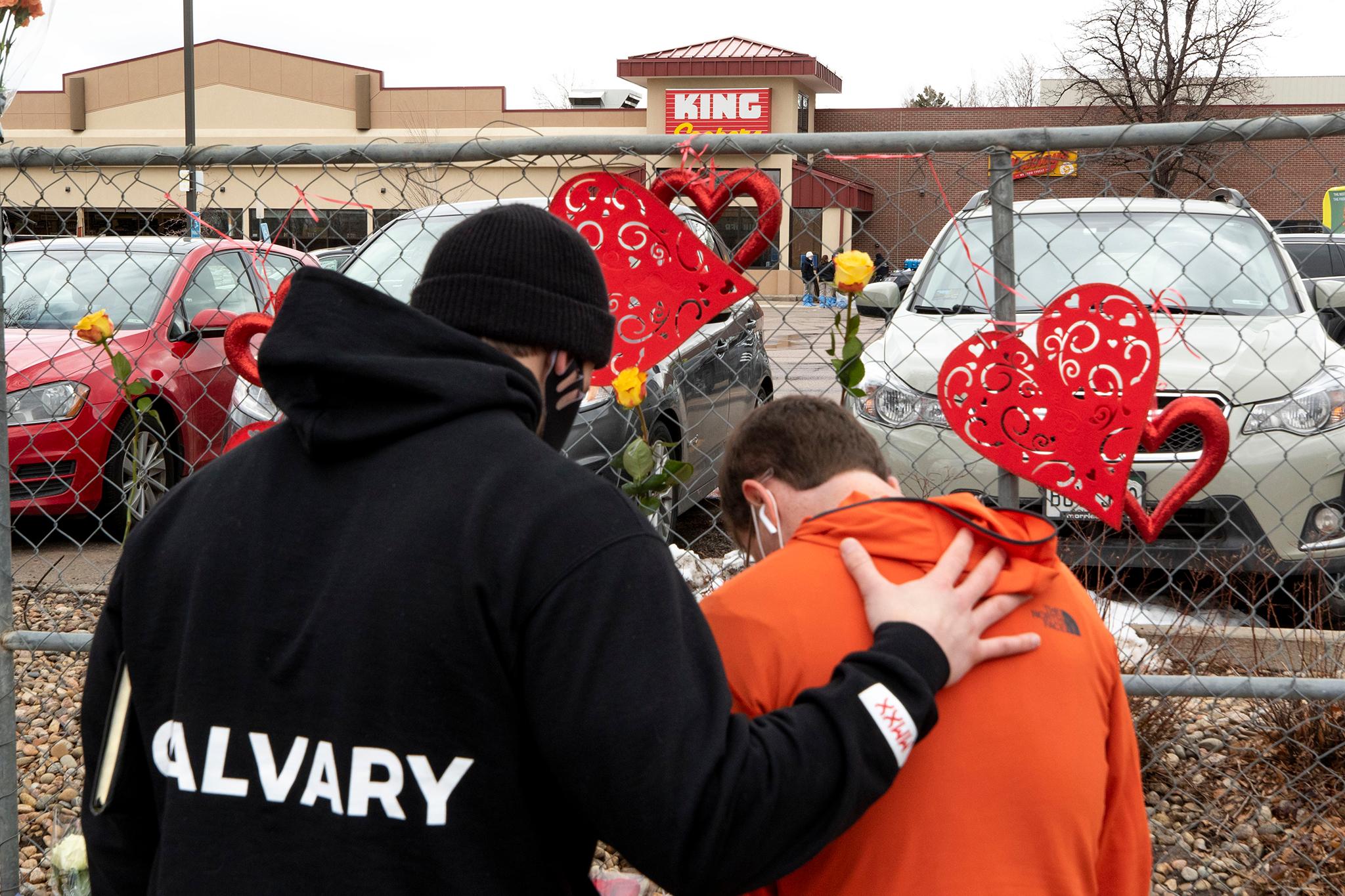
The mental health effects of mass shootings can reverberate through communities. As people learn about the shooting at a King Soopers in Boulder Monday and grieve the 10 people who were killed, psychologists say it’s normal to feel the weight of compounding traumas.
Metro Denver has one of the highest rates of mass shootings, per capita in the country since 1999. The trauma of shootings in public places can still be vivid for many people affected directly and indirectly.
Frank DeAngelis was the principal of Columbine High School during the 1999 shooting. He said it’s disheartening to feel the rollercoasters of emotion more than 20 years later.
“People feel all of a sudden, ‘Geez, you know, this is the best I've felt in a while.’ And then an event happens ... they're retraumatized and triggers are set. And I can't tell you the number of former Columbine staff that reached out to me today to check in or to say, ‘Boy, I don't know how you're feeling, but it took him back to that time,” DeAngelis said.
If you need help, dial 988 to reach the Suicide and Crisis Lifeline. You can also reach the Colorado Crisis Services hotline at 1-844-493-8255 or text “TALK” to 38255 to speak with a trained counselor or professional. Counselors are also available at walk-in locations or online to chat.
That squares with what psychologists have learned about how people experience traumatic events.
“What we know about trauma is that it does tend to trigger experiences that we’ve had either directly or indirectly that were similar or scary, and our central nervous system doesn’t really differentiate between necessarily what is happening now and some of the things that have happened in the past,” said Rick Ginsberg, a licensed psychologist and former president of the Colorado Psychological Association.
In the aftermath of a new shooting, that means people's memories of past traumatic events rush back to them.
“It can be extremely overwhelming and distressing for people and dysregulating,” Ginsberg said.
Those stresses are compounded by the pandemic. Many people are living with a heightened awareness of risks as they also navigate death, illness, relationship strain and economic crisis. But Ginsberg said that people may not realize how much stress they’ve been carrying.
“People get habituated to stressful events ... They persevere through them and they don't really know how much it's affecting them psychologically,” Ginsberg said. “So many of us have experienced incredible trauma and distress based on the pandemic alone. Now on top of that, people are experiencing the fear and the uncertainty about getting out in the world. And that is compounded of course, by these sorts of terrible events that happen.”
Ginsberg offered perspective on how people can care for their mental health right now.
Interview Highlights
Even if other people “have it worse,” pain is not relative:
“Everybody experiences pain and suffering and trauma in their own way, and it's not really useful for any of us to try to compare that to anyone else's. We're all struggling through distress and trauma when we hear about things like this horrible and senseless shooting and other tragedies, and so really need to try to take care of ourselves, attend to our own emotions, understand what our own distress is as we go forward and try to be kind and gentle to ourselves.”
It can help to initiate conversations about how trauma is affecting you and ask people how they are feeling — including kids:
“We want to make sure that we're giving ourselves and other people the opportunity to talk about things. And being able to talk or write or express our feelings is irrefutable. It just makes us healthier, especially around times of trauma. So I would say, ensure that you're opening the doors for people to talk with one another, to talk with children.”
Distractions count as self-care:
“Practice a lot of self care. That can be everything from walking to exercise, to meditation, to creative expression, to writing things. Anything that falls into that self care category is wonderful, including distraction.”
It is important to be aware of the ways trauma may be affecting you, distress signals in your mood or body:
“This really runs the gamut from things that are almost undetectable to things that paralyze us... It can be anything from, you're not sleeping as well as usual, you're not as optimistic as you once were, you’re a little bit more irritable...to things that become more noticeable. So you're being short with friends, family loved ones in your relationships. You're having difficulty concentrating at work. If you find yourself relying on substances more, or any sort of compulsive behavior, that's a sign that you're looking for some calming sense or something that's going to anesthetize you a little bit. And then on the upper end of those distress signals are things like major depression or anxiety attacks, a lot of avoidance of place, obsessing about things.”
You may feel uneasy in places you go routinely, that’s normal:
“Anything from apprehension to some trepidation to outright fear of going out into the world and places that you might visit regularly is really normal in these sorts of situations. It can range from anything from psychologically feeling a little bit more irritable to feeling some muscle tension, to actually being short of breath and having something that feels like a panic attack or an outright panic attack. So the first advice that I think clinicians give people is to really be aware of what it is that they're experiencing physically as well as emotionally and then to take your time exposing yourself to these new situations.
You may benefit from professional help, whether you’re feeling “really stuck” or reaching out proactively:
Ginsberg said that primary care physicians can be a good place to start for advice on finding a mental health clinician. He also recommended county and city community health centers, as well as looking for licensed counselors in online directories, including the Colorado Psychological Association.
A few other resources
Colorado Crisis Services: This statewide behavioral health crisis response system offers residents mental health, substance use or emotional crisis help, information and referrals. Providing free, confidential support via phone, text or walk-in, 24/7/365, regardless of ability to pay. — 844-493-8255, or text “TALK” to 38255
Community Reach Center: Helping to address mental health concerns — including depression and anxiety, grief and loss, substance use disorder, bipolar disorder, schizophrenia or upset related to a traumatic event. — 303-853-3500
Boulder Community Health — Behavioral Health: Treating a wide variety of child, adolescent, and adult behavioral, emotional and substance abuse disorders in Boulder. — 303-415-4299
Denver Health — Behavioral Health: Treating a wide variety of child, adolescent, and adult behavioral, emotional and substance abuse disorders in Denver. — 303-602-4851
- Donations: How You Can Help The Families Of The Boulder Shooting Victims
- Victims: Who We Lost In The Boulder King Soopers Shooting
- King Soopers Employees: "We Weren't Already Hard Enough? This Had To Happen Too?”
- Motive: Police Are Still Searching For A Motive
- Weapon: The Firearm The Suspect Bought Looks Like A Rifle, But It's Regulated Like A Handgun
- Guns: We Want To Hear From You: What Do You Want To Know About Gun Laws In Colorado?
- Next Steps: Colorado Lawmakers Are Considering A Ban On 'Assault-Style' Weapons
- In Photos: Here's Some Of What We Saw As Last Week Unfolded
- Mass Shootings: Colorado Has More Mass Shootings Than Other Places
- Mental Health: As Mass Shootings And Pandemic Collide In Colorado, Mental Health Experts Urge Connection Now More Than Ever
- Suspect: Boulder DA expects to file additional charges against the 21-year-old shooter
CPR's Ryan Warner and Michelle Fulcher contributed to this story.









